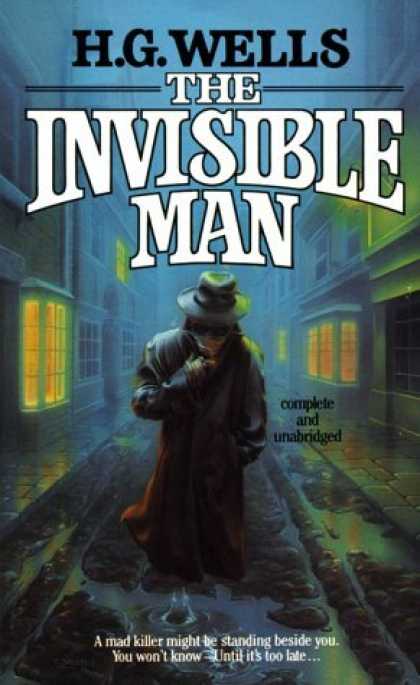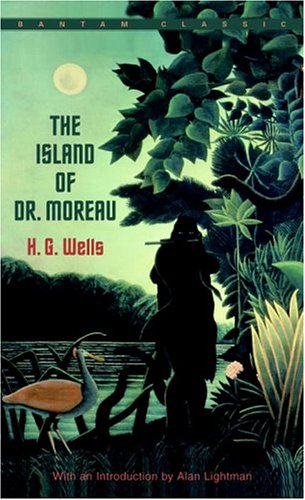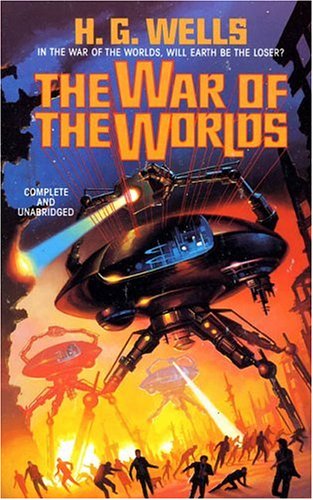Storytellers continue adapting Wells’ many novels into movies, television and radio shows, and yet none of these interpretations eliminate the joy of reading his original works:

|
“The Invisible Man” has spawned countless spin-offs, comedies and horror films alike. In it, Welles addresses the common fantasy many of us share of turning invisible and turns it on its head. The scientist in this book believes he will have many advantages as an invisible man, but the reality is more of a nightmare. He must run around nude in the winter, sleep is difficult because light comes right through his eyelids, and everyone he tries to sneak up on either hears him or detects his mass.

|
“The Island of Dr. Moreau” has seen 3 adaptations, the first being 1933’s “The Island of Lost Souls.” This tale takes a cautionary tone, where most of his works are more neutral toward technology. It embraces Darwin’s concepts that human beings are evolved from animals, and when Moreau transmogrifies animals into humans, their animal-like behaviors take more human qualities as well. They drink, fight, and copulate like drunken sailors on a binge. When their society collapses, the human observer falls with all of the animals, living much like one of them. Recidivism we all may fall prey to.

|
“The Time Machine” has 3 adaptations (that I know of). Wells used it as a vehicle to satirize the differences between the wealthy and the worker classes by speculating on the evolutionary outcome of this social architecture. In an ironic future, the worker class has evolved into a race of monsters, the morlocks, dwelling in caverns below the earth, instinctually caring for the machinery that runs the world above. At night they come to the surface to feed on what the wealthy class members have evolved into, tiny, childlike creatures weak both physically and mentally. The book is wonderful for its speculations on the Earth’s fate and Welles’ fantastic understanding of Evolution.

|
“The War of the Worlds” saw its third film adaptation this year by Steven Spielburg. His production was preceded by the film “Independence Day” and another film adaptation in 1953. Before these, the legendary Orson Welles produced his historic and infamous radio adaptation. While many see the books conclusion as deus ex machina, with the Martians falling prey to the many viruses and bacteria that inhabit the Earth, Wells eloquently explains how millions of years of evolution won the war:
These germs of disease have taken toll of humanity since the beginning of things–taken toll of our prehuman ancestors since life began here. But by virtue of this natural selection of our kind we have developed resisting power; to no germs do we succumb without a struggle, and to many–those that cause putrefaction in dead matter, for instance–our living frames are altogether immune… By the toll of a billion deaths man has bought his birthright of the earth, and it is his against all comers; it would still be his were the Martians ten times as mighty as they are. For neither do men live nor die in vain.
“By the toll of a billion deaths man has bought his birthright of the earth.” What an inspiring way to convey our species experience with Natural Selection. The superior Martian technology cannot take a planet that we have won through hundreds of millions of years of adaptation.
These are only the most prominent of H.G. Welles works. “The Star” is one of my favorite short stories, impossible to adapt to any medium beyond the written word. It tells the story of a new star appearing in the sky. This is Uranus recently collided with another planetoid and now falling toward the sun. In a few thousand words, Wells catalogues modern society’s inability to comprehend the threat facing them and the swift cataclysm that befalls the Earth, leaving a world forever changed in the wake of the flaming planet’s passing.
In order for a work to transcend prose and become literature, it must continue to speak to us in the present day, speak to timeless properties of the human condition. H.G. Wells’ works achieve this, but also go the steps further, revealing to us elements of our existence of which we were unaware. Like the very best of speculative fiction writers, Wells takes us to the true end of the Earth, expands our horizons to threats outside of our immediate surroundings, and exposes flaws within our psyches that only the most fantastic situations can illustrate.
Most of all, Wells remains a wonderful read after over a century of being in print because he embraced science, evolution, technology, and progress. He adapted his worldview to the new facts of his age, saw the truth, and worked it into his cognitive schema. He wrote about the truth, which endured, and his works have endured with it. That was his most inspiring virtue.